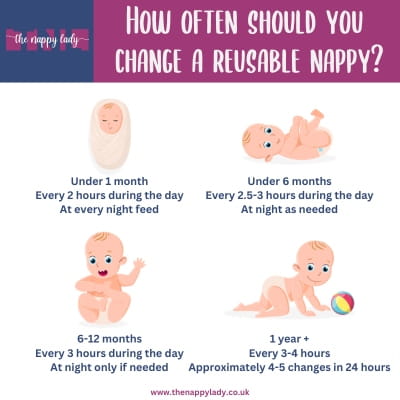New parents often wonder how often they should change a newborn’s diaper. This question is important for the comfort and health of your baby. Diapers keep your baby dry and clean, but changing them too often or too infrequently can lead to problems. Here’s a detailed look at how often you should change a newborn’s diaper, what signs to watch for, and tips on managing diaper changes.
Why Changing Diapers Is Important
Changing diapers is a crucial part of newborn care. Babies have sensitive skin that can easily get irritated. A wet or soiled diaper can cause diaper rash, which is uncomfortable for your baby. Regular changes help prevent this issue and keep the skin healthy.
Would you like to see this content of ours Sleep Regression in Newborns: What Parents Need to Know
Moreover, changing diapers frequently helps keep your baby clean and comfortable. This can lead to better sleep patterns and improved overall well-being. Parents should aim to check their baby’s diaper regularly, especially in the early weeks when diaper changes are frequent.
How Often Should You Change a Newborn’s Diaper?
The general recommendation is to change a newborn’s diaper every 2 to 3 hours during the day. However, this can vary based on several factors:
- Diaper Type: Some diapers are designed to absorb more moisture than others. If you use highly absorbent diapers, you may not need to change them as often.
- Baby’s Age: Newborns tend to urinate frequently due to their small bladders. As they grow, they may urinate less often.
- Feeding Schedule: Babies typically pee after feeding. If your baby feeds every 2 hours, expect to change their diaper around that time.
In general, if your baby has a wet diaper, it’s time for a change. If they have a bowel movement, change the diaper immediately to prevent irritation.
Recognizing When It’s Time for a Change
There are clear signs that indicate it’s time to change your newborn’s diaper:
- Weight: A wet diaper feels heavier than a dry one. If it seems full or heavy, it’s time for a change.
- Smell: A soiled diaper usually has a strong odor. If you notice any unpleasant smells, check the diaper.
- Irritability: Sometimes babies become fussy when they need a diaper change. If your baby seems uncomfortable or cranky, check their diaper.
The Average Number of Diaper Changes per Day
Newborns typically need about 10 to 12 diaper changes in a 24-hour period. This number can fluctuate based on various factors:
- Breastfed vs. Formula Fed: Breastfed babies might have more frequent bowel movements compared to formula-fed babies.
- Individual Differences: Every baby is unique. Some may need more changes if they produce more waste.
If you find yourself changing diapers less frequently than this average, monitor your baby closely. Fewer than 6 wet diapers in a day could be a sign of dehydration or other issues requiring medical advice.
The Diaper Change Process
Knowing how to change a newborn’s diaper properly makes the process smoother for both you and your baby. Here’s how it works:
- Gather Supplies: Before starting, gather everything you need: clean diapers, wipes, and ointment if needed.
- Lay Your Baby Down: Place your baby on a clean surface, ideally a changing table or mat.
- Remove the Dirty Diaper: Unfasten the dirty diaper tabs carefully. Lift your baby’s legs by holding their ankles gently and fold the dirty diaper under them.
- Cleansing: Use wipes or soft cloths to clean the baby’s bottom from front to back. This helps prevent infection.
- Add Ointment (if needed): If there’s redness or rash, apply ointment before putting on the new diaper.
- Add Fresh Diaper: Slide the fresh diaper under your baby and secure it snugly but not too tight around their waist and legs.
This method helps ensure that each change is quick and effective while keeping your baby comfortable throughout the process.
Tips for Managing Diaper Changes
Here are some tips to make the process easier:
- Create a Routine: Developing a consistent routine helps you stay organized and ensures you don’t miss any changes.
- Keeps Supplies Handy: Keep all necessary supplies within reach during changes to avoid leaving your baby unattended.
- Select Comfortable Clothing: Dress your baby in clothes that are easy to remove during changes; this speeds up the process.
- Avoid Over-Wrapping: Make sure not to put on too many layers of clothing which can make accessing the diaper difficult.
Pediatrician Recommendations on Diaper Changes
Pediatricians often advise parents on proper hygiene practices regarding diaper changes. They recommend frequent checks and changes as necessary to keep your baby comfortable and healthy. Many doctors suggest always changing your baby’s diaper after every feeding and when they wake up from naps since these times typically coincide with wetness or soiling.
If you’re ever in doubt about how often you should change your newborn’s diaper or notice unusual patterns in urination or bowel movements, consult with your pediatrician for personalized advice tailored to your baby’s needs.
The Impact of Diet on Diaper Changes
Your baby’s diet plays a significant role in how often you’ll need to change their diapers. Breastfed babies usually have more frequent bowel movements than formula-fed babies due to the digestibility of breast milk. It’s common for breastfed infants to have several wet diapers daily as their bodies process milk efficiently and excrete waste more rapidly.
If you’re feeding formula, be aware that it may take longer for waste to pass through their system, potentially resulting in fewer dirty diapers throughout the day. Regardless of feeding type, maintaining healthy hydration is crucial for proper digestion and regular elimination of waste products through urine and stool.
The Role of Diaper Rash Cream
If you notice redness or irritation during changes, consider using a barrier cream or ointment designed specifically for preventing diaper rash. Applying ointment at each change offers an extra layer of protection against moisture and friction that can irritate sensitive skin areas around the diaper zone. Always consult with your pediatrician if rash persists despite regular changes and cream application as it could indicate an underlying issue requiring further treatment options.
The Best Practices for Nighttime Changes
If you’re worried about nighttime changes disrupting sleep patterns for both you and your newborn, here are some effective strategies:
- Bigger Diapers: Consider using overnight diapers designed with added absorbency; these can last longer without needing frequent changes during sleep hours.
- Cue Recognition: Learn cues from your baby so that you know when it’s best time for checking—this may reduce unnecessary disturbances throughout the night while still catching any urgent needs!
- Dimming Lights: Keep lights dim while changing at night; this helps maintain sleepiness for both parent and child alike!
The Importance of Monitoring Your Baby’s Health Through Diapers
The state of your baby’s diapers can provide valuable insights into their health status overall—monitoring color variations in urine or unusual stool consistency can alert parents early if something seems off! For instance, dark concentrated urine could signal dehydration whereas very pale stool might contribute towards concerns about digestive absorption issues; thus tracking these details regularly becomes essential in ensuring optimal wellbeing as babies grow!
Frequently Asked Questions
How do I know if my baby’s diaper is wet?
You can check if the diaper feels heavy or swollen compared to when it was first put on. Some modern disposable diapers have indicators that change color when wet.
What should I do if my newborn has a rash?
If you notice any signs of rash, try using ointments specifically designed for preventing or treating rashes after each change until irritation clears up. Consult with pediatricians if rash persists despite home care measures being taken!
Aren’t disposable diapers bad for the environment?
This concern varies among individuals; while disposables offer convenience in terms of cleaning up messes quickly—they do generate waste accumulating in landfills over time! Parents looking for eco-friendly alternatives might consider cloth options which require washing but result in less overall waste generation long-term!
Can I leave my newborn longer between changes overnight?
You may opt for longer intervals at night using specialized overnight diapers designed with superior absorbency features tailored toward minimizing disturbances during sleep cycles while still keeping infants comfortable!
If my baby doesn’t poop every day is that normal?
This largely depends upon dietary choices; breastfed babies might go multiple days without pooping due primarily because of efficient absorption rates! However if there are signs indicating discomfort along with decreased frequency—it’s advisable consulting healthcare professionals regarding any concerns raised surrounding digestive health matters!
The Conclusion About Changing Newborn Diapers
The frequency at which you should change a newborn’s diaper is important knowledge for new parents. Aim for every 2-3 hours during the day and at least 10-12 times daily overall while paying attention closely towards visual cues indicating discomfort necessitating immediate action! Maintaining proper hygiene practices alongside monitoring health indicators via observations made through regular checks will ensure both comfort levels maintained along with supporting overall growth development milestones achieved smoothly without delays caused by unnecessary complications arising from improper care techniques applied consistently throughout early stages life!

